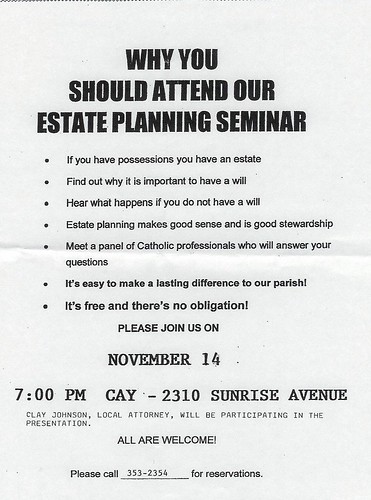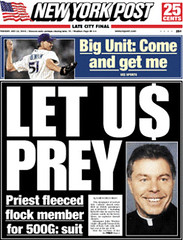
Flyer from St. Mary's Church, Portsmouth
In November 2005, Teresa Mollette reported in her informative website that St. Mary’s [Catholic] Church was offering a free seminar in “estate planning,” (a euphemism for “making a will”) for older members of the parish. As a member of the parish, Teresa Mollete was offended by the flyer and by Clayton Johnson's name on it. As an ex-Catholic, I reflected on the flyer and the "estate planning" it seeks to promote, and here is my two cents worth.
I don’t know what it’s like to grow up Catholic now, in Portsmouth, Ohio, or anywhere else, but I know what it was like to grow up a Catholic in Boston back in the 1940s. At about the age of seven, some years before I had reached the stage where I could begin to think for myself, I was introduced, through priests and nuns, to all the horrors of hell that Catholic theologians had been imagining for centuries. I was taught as a child that that Protestants, Jews and almost everyone else were going straight to hell, and that only Catholics could escape this horrible place.
Back in the 1940s, many Catholics believed in the doctrine of Extra Ecclesiam Nulla Salus, or No Salvation Outside the Catholic Church. To say that this doctrine created a deep sense of dependency in Catholics upon the Church would be an understatement. Catholics were dependent not just upon Christ but upon the Church for their salvation. To use marketing terms, which are appropriate in this case, what the Church instilled in Catholics was the ultimate form of brand loyalty. Stick with the Church, be a good and faithful Catholic, and the reward will be eternal happiness. Could any other product possibly offer more?
Fast forward more than a half century. Those same children who were taught that the Church was their door to salvation are now senior citizens. Probably they have accumulated some worldly goods, they have an "estate." "If you have possessions you have an estate," as the first bulleted item on the St. Mary's flyer puts it. As a Catholic, you want to do right by those you love, especially your children and deserving relatives. But you cannot afford to forget heaven and hell, you cannot afford to forget the Church, which offered you the opportunity to escape hell. Yes, you have an obligation to those you love and who love you, but who loved you and offered you more than Jesus and his sacrifice upon the cross, and of all institutions on earth, which one truly represents Jesus? The Holy Roman Catholic Church. Of all your obligations, which is greater than your obligation, as a Catholic, to the Church? The mention of "stewardship" in the fourth bullet invokes the notion that whatever we acquire in life is a loan from the Lord, and Catholics need to pay at least part of it back, back not just to heirs but to the Church, which truly and exclusively represents Christ.
The St. Mary's flyer does not say anything about salvation. The closest it comes to tapping into the fears and hopes of seniors raised on Catholic dogma is the next to the last bullet, "It is easy to make a lasting contribution to our parish!" How easy? How lasting? Well, just "Come and meet our panel of professional Catholics who will answer your questions," to quote another of the bulleted items in the flyer.
Why is the Church engaging in this profane huckstering? Why is it resorting to flyers to promote estate planning, thereby putting it in the same class as Pizza Hut, three for the price of two, with three toppings? The Church is doing it because it is financially, not to mention spiritually, desperate. By the Church I mean the hierarchy, not the laity. Boston Globe columnist and former seminarian James Carroll wrote in "Basilica of Denial" that what the sexual abuse scandal reveals is “the moral bankruptcy of the entire Catholic clerical culture" (5 Dec. 2005). Whatever else it is, the Church is a business, a big business, and it is in big big trouble. Pride goeth before a fall, and flyers come humbling after.
Catholic anti-Semitism in
In what typographically looks like a footnote, because it is at the bottom, unbulleted, and in small print, the flyer says "Clay Johnson, local attorney, will be participating in the presentation." (Beware the fine print in all documents, because the devil is usually in the details.) The flyer does not point out that Johnson is a Protestant, nor does it point out that in addition to being perhaps the most successful and influential lawyer in Portsmouth, he is also one of the most controversial and distrusted. In the view of his critics, he is the Presbyterian godfather of Portsmouth. He was the key figure in the notorious sale of the empty and virtually worthless Marting department building to the city for $2 million, a sale that has since been ruled illegal, and Marting’s, as visitors to Mollette’s website can see, is just the tip of the Johnson iceberg. But the important thing is not Johnson's religion but that he is successful, and usually gets his way, as he probably will in the Marting's deal, and why would you leave somebody like that off your Catholic dream team of professionals just because he isn't a Catholic?
St. Mary’s offering to assist seniors making out their wills, with Johnson as part of the team, sounds like a turkey farmer hiring a fox to help the turkeys prepare for Thanksgiving. St. Mary’s is not the only Catholic church offering to assist parishioners with their “estate planning." Parishes and Catholic agencies in other parts of the country are tuning up their estate planning efforts and occasionally turning to non-Catholic lawyers for advice and assistance. Martin M. Shenkman is a New Jersey lawyer whose practice focused on divorce cases before he shifted to estate planning. Shenkman’s publications include Divorce Rules For Men: A Man to Man Guide for Managing Your Split and Saving Thousands and also Inherit More, a how-to book on how children can maximize their inheritance from their parents, which sounds like a keep-it-in-the-family version of estate planning. Shenkman offered the following advice for Catholics online in a posting titled “Catholic Issues in Estate Planning”: “A religious person near the end of their life starts to look more towards spiritual matters. They often have the idea to do something good for their Parish, church or other worthy cause. It’s important for estate planners to facilitate giving clients the opportunity to accomplish these goals.” The use of the vague infinitive “to facilitate” and the somewhat paraphrastic construction of the sentences ("to do something good") is presumably evasive legalese whose goal is to avoid being too obvious about the underlying issue of “Catholic issues,” which is that while seniors are “looking towards spiritual matters,” the estate planners and lawyers should be looking toward financial matters and seeing that the Church gets its cut of the estate.
Forbes Magazine, looking at the Church as a business, said that “Between tort lawsuits and declining attendance, the Roman Catholic Church in North America is a financial mess. . . . No one denies the American Church is in trouble. Over the past four decades regular attendance at Mass has collapsed from 75% of those who professed to be Catholic to 40% today. Nearly one in five churches doesn't have a resident priest. In those that do, parishioners are increasingly likely to hear Mass said in thickly accented English by a prelate from Nigeria or the Philippines. Many parishioners are still furious about the sex-abuse scandals – as well as the coverups and sizable payouts that followed – comparing their impact to the shock of Sept. 11.”
Estate scamming Msgr.

It’s not just the pedophile priests who are the problem. Don't forget Monsignor Eugene V. Clark, the 79-year-old rector of St. Patrick’s Cathedral, in New York, who was caught motelling with his younger married secretary, as I pointed out in “Viagra Chronicles,” or the New York high-life Monsignor John Woolsey, a leader in the right-to-life movement, who reportedly bilked an elderly parishioner who was nearing the end of hers of $500,000 so he could finance his Gucci-golfing lifestyle. Operating his own estate planning scam, he also got her to write her will in his favor. While the priest's good looks may have charmed the old lady, someone of her generation was likely to be more influenced by her conviction that he was the representative of the Church, which held the keys to the kingdom.
Because of the role the Church has claimed to occupy as the exclusive mediator of salvation, it is a scandalous conflict of interest for parishes to let their lawyers have anything to do with the estate planning of elderly Catholics, just as it was criminally negligent of the Church, and in particular Cardinal Bernard Law, the Archbishop emeritus of Boston, to let pedophile priests have anything to do with Catholic children. Elderly Catholics of my generation, and younger, who were terrorized as children with the threat of eternal damnation, especially if they are being advised by a clever lawyers in the employ of the Church, would understandably be inclined to will the Church a good chunk of the goods they accumulated in this world as a way of insuring that they would not roast eternally in the next.
 The battered cross that lay on the site of the future Catholic parking lot for a month could serve as a reminder of how spiritual things sometimes get neglected in property exchanges and estate planning. I was told by one source that the money that the Church of the Holy Redeemer used to buy and demolish the old Methodist church, whose destruction I described in “Double Cross,” came from an anonymous well-to-do Catholic, suggesting that, some of the faithful may feel the road to heaven is paved with parking lots.
The battered cross that lay on the site of the future Catholic parking lot for a month could serve as a reminder of how spiritual things sometimes get neglected in property exchanges and estate planning. I was told by one source that the money that the Church of the Holy Redeemer used to buy and demolish the old Methodist church, whose destruction I described in “Double Cross,” came from an anonymous well-to-do Catholic, suggesting that, some of the faithful may feel the road to heaven is paved with parking lots.The Forbes article on the Church’s financial crisis concludes with the question, “Is ANYONE up there listening?” I will conclude with a different question: Is ANYONE up there counting how much you leave to the parish, i.e., the Church? If as a Catholic you even remotely suspect there is SOMEONE up there counting how much you leave, and who is making a hit list and checking it twice, then sign up for a freebee church-sponsored estate planning seminar because it’s a hell of a bargain.